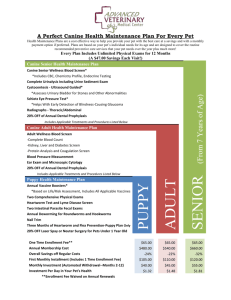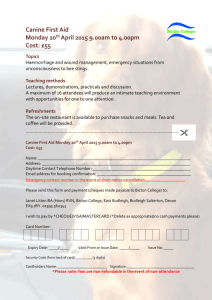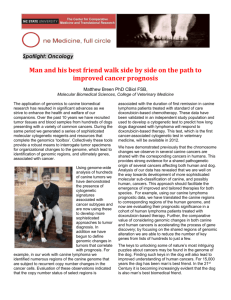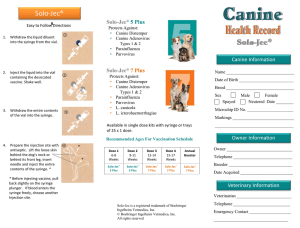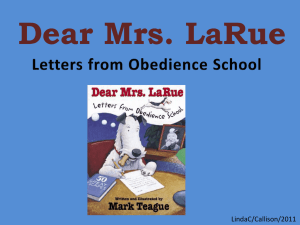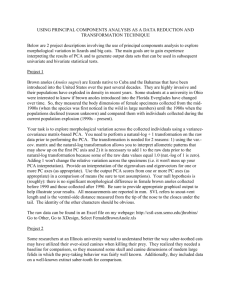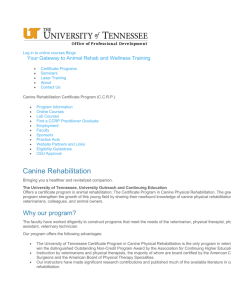Foundation Degree Science Canine Studies (February 2013)
advertisement
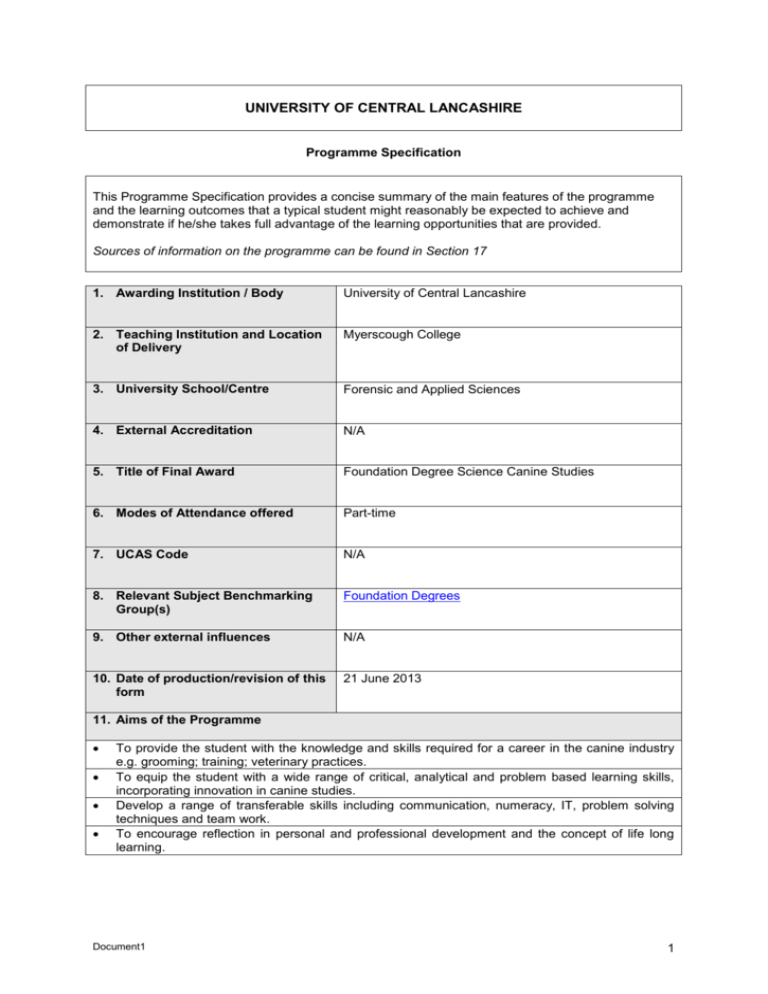
UNIVERSITY OF CENTRAL LANCASHIRE Programme Specification This Programme Specification provides a concise summary of the main features of the programme and the learning outcomes that a typical student might reasonably be expected to achieve and demonstrate if he/she takes full advantage of the learning opportunities that are provided. Sources of information on the programme can be found in Section 17 1. Awarding Institution / Body University of Central Lancashire 2. Teaching Institution and Location of Delivery Myerscough College 3. University School/Centre Forensic and Applied Sciences 4. External Accreditation N/A 5. Title of Final Award Foundation Degree Science Canine Studies 6. Modes of Attendance offered Part-time 7. UCAS Code N/A 8. Relevant Subject Benchmarking Group(s) Foundation Degrees 9. Other external influences N/A 10. Date of production/revision of this form 21 June 2013 11. Aims of the Programme To provide the student with the knowledge and skills required for a career in the canine industry e.g. grooming; training; veterinary practices. To equip the student with a wide range of critical, analytical and problem based learning skills, incorporating innovation in canine studies. Develop a range of transferable skills including communication, numeracy, IT, problem solving techniques and team work. To encourage reflection in personal and professional development and the concept of life long learning. Document1 1 12. Learning Outcomes, Teaching, Learning and Assessment Methods A. A1. A2. Knowledge and Understanding Describe current practices and applications in canine related industries Demonstrate an understanding of the application of current research in the field of canine studies A3. Evaluate the application of technological developments and improvements in the canine industry and their impact on the welfare of dogs A4. Demonstrate knowledge and understanding of a range of enterprises utilising canines in society. Teaching and Learning Methods For on-line delivery: core material will be delivered through a programmed series of discrete on-line sessions on Blackboard VLE. These will include session booklets, exercises and interactive materials. In addition, learning is supported by discussion boards, relevant case studies and formative assessments and the usage of BREEZE technology for “live” lecture sessions, enabling the students to interact throughout the session. Independent learning will be aided by library resources and on-line academic databases (e.g. Athens). Students will also attend three compulsory Study Skills workshops per academic year to support their learning, incorporating guest speakers, practical sessions and laboratory sessions as appropriate to the stage on the course. Incorporated within their studies students will have involvement in the canine industry, which will offer parity with other full-time foundation degrees. Assessment methods Combination of coursework and unseen examinations will be used. The coursework assessment methods will include reports, portfolios of evidence, laboratory/practical reports, essays and extended project work. Students may also be required to produce work in a range of formats, such as posters, taped/recorded footage, leaflets. B. B1. B2. Subject-specific skills Describe varying theoretical perspectives pertaining to the origins of canine behaviour Demonstrate competence in analysing and discussing the relevance of canine developmental stages B3. Understand the relevance of knowledge relating to canine sensory systems and how an animal learns B4. Appraise the canine industry in terms of relevant legislation and practice B5. Analyse the aetiology of canine problem behaviour and the impact of human animal interactions B6. Evaluate differing behaviour modification techniques B7. Appraise alternative approaches to improving canine health in the light of well founded evidence B8. Discuss the application of scientific research in canine behaviour. Teaching and Learning Methods For on-line delivery: core material will be delivered through a programmed series of discrete on-line sessions on Blackboard VLE. These will include session booklets, exercises and interactive materials. In addition, learning is supported by discussion boards, relevant case studies and formative assessments and the usage of BREEZE technology for “live” lecture sessions, enabling the students to interact throughout the session. Independent learning will be aided by library resources and on-line academic databases (e.g. Athens). Students will also attend three compulsory Study Skills workshops per academic year to support their learning, incorporating guest speakers, practical sessions and laboratory sessions as appropriate to the stage on the course. Incorporated within their studies students will have involvement in the canine industry, which will offer parity with other full-time foundation degrees. Assessment methods Assessment methods are diverse and include written examinations, reports, portfolios of evidence, laboratory/practical reports, essays and extended project work. Students may also be required to produce work in a range of formats, such as posters, taped/recorded footage, leaflets and presentation skills may also be utilised as formative assessment at the compulsory study skills workshops. Document1 2 C. Thinking Skills C1. Apply creative thinking techniques in problem solving C2. Demonstrate independence in their choice of study in order that personal skills are promoted C3. Analyse problems and provide solutions C4. Evaluate alternative solutions to problems impartially C5. Research issues and present findings demonstrating good communication skills. Teaching and Learning Methods For on-line delivery: core material will be delivered through a programmed series of discrete on-line sessions on Blackboard VLE. These will include session booklets, exercises and interactive materials. In addition, learning is supported by discussion boards, relevant case studies and formative assessments and the usage of BREEZE technology for “live” lecture sessions, enabling the students to interact throughout the session. Independent learning will be aided by library resources and on-line academic databases (e.g. Athens). Students will also attend three compulsory Study Skills workshops per academic year to support their learning, incorporating guest speakers, practical sessions and laboratory sessions as appropriate to the stage on the course. Incorporated within their studies students will have involvement in the canine industry, which will offer parity with other full-time foundation degrees. Assessment methods Combination of coursework and unseen examinations will be used. The coursework assessment methods will include reports, portfolios of evidence, laboratory/practical reports, written essays and extended project work. Students may also be required to produce work in a range of formats, such as magazine articles, press releases, potential publication materials, posters. D. Other skills relevant to employability and personal development D1. Communicate professionally in reports and presentations and utilise information technology skills in a variety of settings D2. Demonstrate the ability to work independently and also as a viable team member D3. Manage projects professionally and efficiently, and extended learning D4. Apply problem solving skills in varying ways and be adept at the utilisation of mathematical formulae D5. Reflect on personal and professional development and seek appropriate, individual developmental needs and recognise personal strengths and limitations. Teaching and Learning Methods For on-line delivery details are as detailed above and as detailed here: core material will be delivered through a programmed series of discrete on-line sessions on Blackboard VLE. These will include session booklets, exercises and interactive materials. In addition, learning is supported by discussion boards, relevant case studies and formative assessments and the usage of BREEZE technology for “live” lecture sessions, enabling the students to interact throughout the session. Independent learning will be aided by library resources and on-line academic databases (e.g. Athens). Students will also attend three compulsory Study Skills workshops per academic year to support their learning, incorporating guest speakers, practical sessions and laboratory sessions as appropriate to the stage on the course. Incorporated within their studies students will have involvement in the canine industry, which will offer parity with other full-time foundation degrees. Assessment methods Assessment methods are diverse and include written examinations, reports, portfolios of evidence, laboratory/practical reports, essays and extended project work. Students may also be required to produce work in a range of formats, such as posters, taped/recorded footage, leaflets and presentation skills may also be assessed either as formative or summative assessments at the compulsory study skills workshops. Document1 3 13. Programme Structures* Level Level 5 Module Code MR2200 MR2228 MR2229 MR2230 MR2231 MR2302 MR2317 Level 4 MR1200 MR1208 MR1225 MR1226 MR1227 MR1229 MR1318 Module Title Work Project Canine Welfare and Legislation Advances in Canine Behaviour Canine Rehabilitation Canine Problem Behaviour and Modification Techniques Business and Entrepreneurism Humans and Animal Interaction Work Skills Development Introduction to Pharmacology Introduction to Canine Behaviour Canine Learning and Training Theory Canine Ontogeny and Sensory Systems Canine Breeding, Health and Management Principles of Canine Nutrition 14. Awards and Credits* Credit rating 20 20 20 10 20 Foundation Degree Science Canine Studies Requires 240 credits including a minimum of 120 at Level 5. 20 10 20 10 20 Foundation Certificate Canine Studies Requires 120 credits at Level 4 or above. 20 20 20 10 15. Personal Development Planning Personal Development Planning is an essential component of the course. The course will help students recognise the importance of being proactive within their own personal development. The course will help develop key personal and transferable skills which promote employability, entrepreneurship, academic excellence, professional development and global citizenship. Each student will be allocated a Personal Tutor with whom students will be encouraged to develop skills for independent learning and reflection on student’s academic, personal and professional development. Students will meet with their personal tutor at least twice per semester to develop short and long-term goals, review and plan their progress on the course and discuss their future career path. Each student group has a weekly timetabled and structured course tutorial which will be used to develop generic personal, employability and academic skills with student groups. An on-line scheme of work, together with web based and other support materials, is available to staff and students alike in the delivery of these tutorial sessions. Students have access to a wide range of personal development advisory services through the ‘Core’ including careers, financial advice, pastoral support and help with study skills. Students have access to the student support services at the University through the ‘I’, ‘Futures’ and ‘WISER’ study skills. Students on Foundation Degrees are also encouraged to reflect on their personal and professional development within a professional setting through the Work Skills Development module and subsequently the Work Project module. These modules will further help students plan realistically for career progression and manage their own career development. All students will also have access to the College ‘Learn2Work’ programme and activities that contribute to ensuring employability of our students can also count towards the ‘Learn2Work’ awards. Document1 4 16. Admissions criteria Programme Specifications include minimum entry requirements, including academic qualifications, together with appropriate experience and skills required for entry to study. These criteria may be expressed as a range rather than a specific grade. Amendments to entry requirements may have been made after these documents were published and you should consult the University’s website for the most up to date information. Students will be informed of their personal minimum entry criteria in their offer letter. 120 UCAS Tariff points from one of the following: 2 A-levels (at least one at C) BTEC Level 3 Extended Diploma at PPP BTEC Level 3 Diploma at MP 2 Scottish Highers at minimum C or above 3 Irish Highers at minimum C or above NVQ Level 3 in a relevant discipline International Baccalaureate Diploma at 24 points AS levels and Scottish Intermediate 2s may be used to contribute to entry requirements but they are not sufficient for entry on their own. Alternative equivalent qualifications will also be considered positively. Consideration will be given to non-traditional qualifications and relevant work experience. Applicants are encouraged to produce evidence of their potential to benefit from the course. Applicants who believe they may be eligible for Accreditation of Prior Certificated and/or Experiential Learning (APCL/APEL) for certain modules will be considered on an individual basis. Applicants who do not hold a Level 3 qualification but have extensive relevant experience may be offered opportunity to undertake a pre-entry assignment to demonstrate ability to study at the required level. Applicants for whom English is a second language must be able to demonstrate proof of International English Language Testing System (IELTS) at level 6.0 (with no component score lower than 5.5) or equivalent. All offers may be subject to successful interview. 17. Key sources of information about the programme Myerscough College web site: www.myerscough.ac.uk Myerscough College higher education prospectus: http://www.myerscough.ac.uk/?page=Prospectuses Course fact sheet: http://www.myerscough.ac.uk/?page=subjects-animal-studies-HE Course Tutor: Jackie Hough Document1 5 18. Curriculum Skills Map Ticks indicate where individual Programme Learning Outcomes will be assessed Programme Learning Outcomes 4 5 Module Level Code Module Title Core (C), Compulsory (COMP) or Option (O) Knowledge and understanding Subject-specific Skills Thinking Skills A1 A2 A3 A4 B1 B2 B3 B4 B5 B6 B7 MR2200 Work Project COMP MR2228 Canine Welfare and COMP Legislation MR2229 Advances in Canine COMP Behaviour MR2230 Canine Rehabilitation COMP MR2231 Canine Problem Behaviour COMP and Modification Techniques MR2302 Business and COMP Entrepreneurism MR2317 Humans and Animal COMP Interaction MR1200 Work Skills Development MR1208 Introduction to Pharmacology MR1225 Introduction to Canine Behaviour MR1226 Canine Learning and Training Theory MR1227 Canine Ontogeny and Sensory Systems MR1229 Canine Breeding, Health and Management MR1318 Principles of Canine Nutrition Note: COMP COMP COMP COMP COMP COMP COMP C1 C2 C3 C4 C5 D1 D2 D3 D4 D5 B8 Other skills relevant to employability and personal development Mapping to other external frameworks, e.g. professional/statutory bodies, will be included within Student Course Handbooks Document1 6
